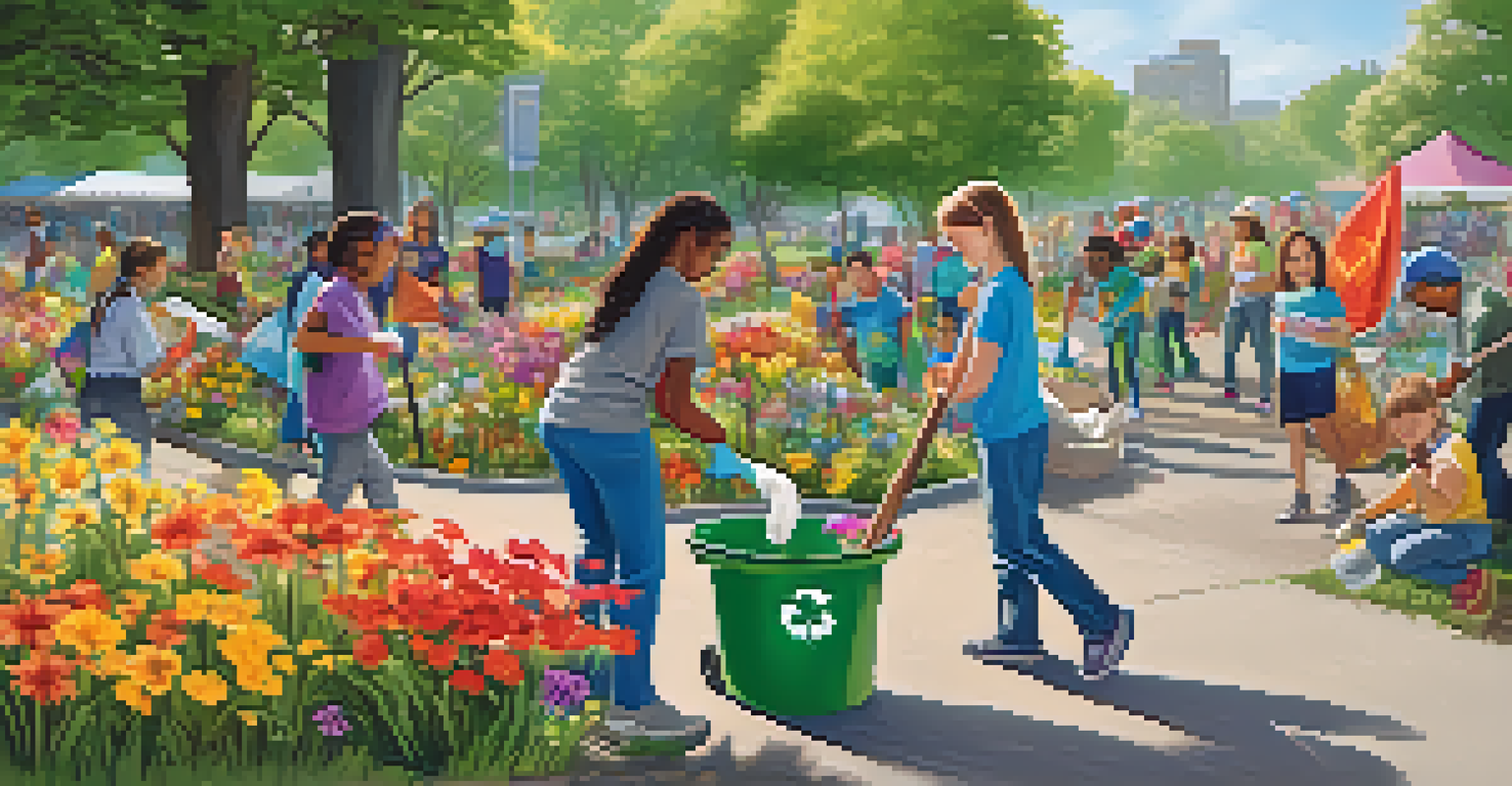Understanding the Impact of Littering in Outdoor Spaces

The Growing Problem of Littering in Nature
Littering has become an alarming issue in outdoor spaces. Whether it's a plastic bottle on a hiking trail or fast-food wrappers at a park, these small acts contribute to a much larger problem. The sheer volume of waste is often overwhelming, with millions of tons discarded each year, impacting natural beauty and ecosystems alike.
The Earth does not belong to us: we belong to the Earth.
When litter accumulates, it not only detracts from the beauty of our surroundings but also poses serious risks to wildlife. Animals can mistake trash for food, leading to dangerous consequences for their health. This unfortunate reality is a reminder that our choices, however insignificant they may seem, can have a ripple effect on the environment.
Moreover, littering can create a cycle of neglect, where areas become more polluted as people feel less inclined to care for spaces that are already dirty. This degradation of our public spaces is a concern we all must acknowledge and address.
Environmental Consequences of Littering
Littering has far-reaching environmental consequences that extend beyond visual pollution. For instance, plastics can take hundreds of years to decompose, leaching harmful chemicals into the soil and waterways. This contamination can disrupt local ecosystems, affecting plants, animals, and even humans who rely on these resources.

Additionally, litter can block drainage systems, leading to flooding and erosion. When natural water flow is obstructed, it can result in significant damage to landscapes, habitats, and infrastructure. This not only poses a risk to local wildlife but can also impact human communities, leading to costly repairs and disruptions.
Littering harms wildlife and nature
The accumulation of litter poses significant risks to wildlife and disrupts natural ecosystems.
The effects of littering can also contribute to climate change. As waste breaks down, it can release greenhouse gases into the atmosphere, further exacerbating global warming. This interconnectedness of littering and environmental health highlights the urgency of addressing this issue.
Social Impacts of Littering on Communities
Littering doesn’t just harm the environment; it also affects the social fabric of communities. Areas plagued by litter often experience a decline in community pride and engagement. When spaces are dirty, residents may feel less inclined to spend time outdoors, leading to a disconnect from nature and each other.
We won't have a society if we destroy the environment.
Furthermore, littered neighborhoods can deter tourism, impacting local economies. Visitors are less likely to explore areas that are littered and uninviting, which can hurt businesses that rely on foot traffic. This economic ripple effect underscores the importance of maintaining clean public spaces.
Additionally, littering can lead to increased crime rates. Studies have shown that areas with higher instances of litter often experience more vandalism and other criminal activities. This correlation suggests that keeping our spaces clean can foster safer, more vibrant communities.
Health Risks Associated with Littering
The health risks associated with littering can often go unnoticed. Trash can attract pests, like rats and insects, which can carry diseases that threaten public health. This is particularly concerning in areas frequented by families and children, who are more vulnerable to these health threats.
Moreover, littered areas can also lead to unsafe conditions for outdoor activities. Broken glass, sharp objects, and hazardous waste pose risks to those enjoying nature. Ensuring our outdoor spaces are clean is essential for creating a safe environment for everyone.
Community pride declines with litter
Littered areas lead to reduced community engagement and can deter tourism, impacting local economies.
Lastly, the psychological impact of littering shouldn't be overlooked. Environments filled with trash can lead to feelings of distress and anxiety, affecting mental well-being. Clean, well-maintained spaces can promote relaxation and a sense of community, showcasing the importance of caring for our surroundings.
The Role of Education in Reducing Littering
Education plays a crucial role in combating littering. By raising awareness about the environmental and social impacts of littering, we can inspire individuals to take action. Schools, community organizations, and local governments can work together to implement programs that educate the public on proper waste disposal.
Workshops, clean-up events, and campaigns can help instill a sense of responsibility and stewardship among community members. This proactive approach encourages individuals to think twice before tossing trash on the ground and fosters a culture of respect for nature.
Moreover, integrating environmental education into school curriculums can cultivate a generation that values sustainability and takes pride in their surroundings. By empowering young people with knowledge, we can create lasting change in attitudes toward littering.
Community Initiatives to Combat Littering
Community initiatives are essential for tackling the littering problem at its roots. Local clean-up events offer a practical way for residents to come together, actively engaging in the beautification of their neighborhoods. These efforts not only remove litter but also help build a sense of community and responsibility among participants.
In addition to clean-ups, many communities are adopting 'Adopt-a-Park' programs, where individuals or groups take responsibility for maintaining specific outdoor spaces. This initiative creates a sense of ownership and pride, motivating people to keep their local parks and trails clean.
Education fosters litter reduction
Raising awareness about the impacts of littering through education can inspire individuals to take action.
Furthermore, collaboration with local businesses can amplify these efforts. Sponsoring recycling bins and trash receptacles in public areas encourages proper waste disposal and demonstrates a collective commitment to maintaining clean environments.
How Individuals Can Make a Difference
While community initiatives are impactful, individual actions are equally vital in the fight against littering. Simple habits, like carrying a reusable water bottle or bag, can significantly reduce the amount of waste generated in outdoor spaces. By making conscious choices, individuals can lead by example and inspire others to do the same.
Participating in local clean-up efforts, even just once a year, can have a profound impact. Not only does it help remove litter, but it also raises awareness about the issue within the community. Sharing experiences on social media can further encourage others to join in these efforts.

Lastly, advocating for policies that support litter reduction—like stricter regulations on single-use plastics—can drive systemic change. Involvement in local government meetings or community forums provides an opportunity to voice concerns and push for sustainable practices within the community.